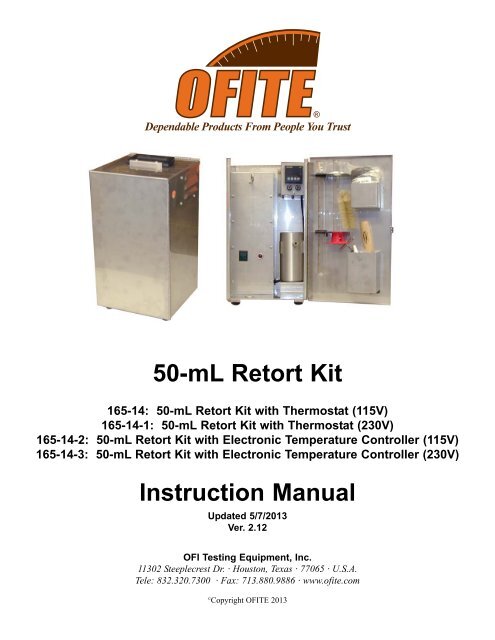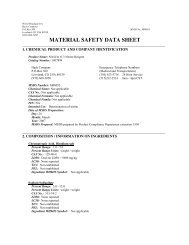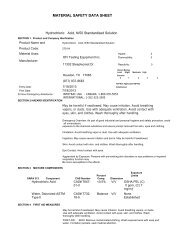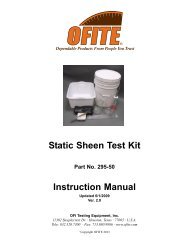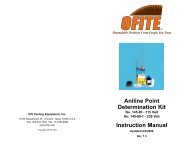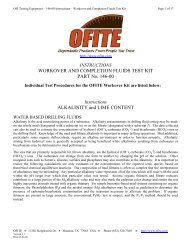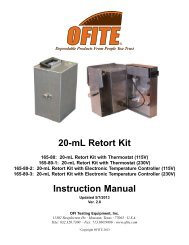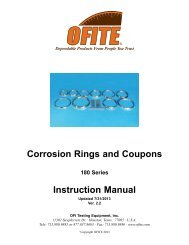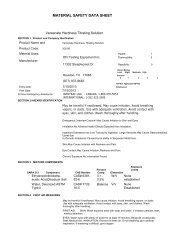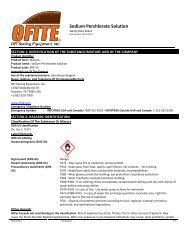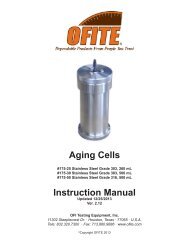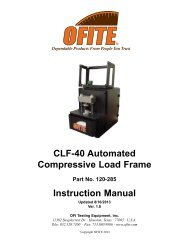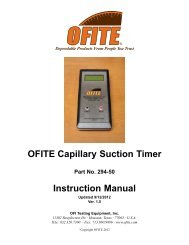50 mL Retort Kit - OFI Testing Equipment, Inc.
50 mL Retort Kit - OFI Testing Equipment, Inc.
50 mL Retort Kit - OFI Testing Equipment, Inc.
Create successful ePaper yourself
Turn your PDF publications into a flip-book with our unique Google optimized e-Paper software.
<strong>50</strong>-<strong>mL</strong> <strong>Retort</strong> <strong>Kit</strong><br />
165-14: <strong>50</strong>-<strong>mL</strong> <strong>Retort</strong> <strong>Kit</strong> with Thermostat (115V)<br />
165-14-1: <strong>50</strong>-<strong>mL</strong> <strong>Retort</strong> <strong>Kit</strong> with Thermostat (230V)<br />
165-14-2: <strong>50</strong>-<strong>mL</strong> <strong>Retort</strong> <strong>Kit</strong> with Electronic Temperature Controller (115V)<br />
165-14-3: <strong>50</strong>-<strong>mL</strong> <strong>Retort</strong> <strong>Kit</strong> with Electronic Temperature Controller (230V)<br />
Instruction Manual<br />
Updated 5/7/2013<br />
Ver. 2.12<br />
<strong>OFI</strong> <strong>Testing</strong> <strong>Equipment</strong>, <strong>Inc</strong>.<br />
11302 Steeplecrest Dr. · Houston, Texas · 77065 · U.S.A.<br />
Tele: 832.320.7300 · Fax: 713.880.9886 · www.ofite.com<br />
©<br />
Copyright <strong>OFI</strong>TE 2013
Table of<br />
Contents<br />
Intro....................................................................................................2<br />
<strong>Equipment</strong>.........................................................................................2<br />
Components......................................................................................3<br />
Safety.................................................................................................5<br />
Operation ..........................................................................................6<br />
Temperature Controller ...................................................................9<br />
Calculations ....................................................................................10<br />
<strong>OFI</strong>TE, 11302 Steeplecrest Dr., Houston, TX 77065 USA / Tel: 832-320-7300 / Fax: 713-880-9886 / www.ofite.com 1
Intro<br />
The retort provides a means for separating and measuring the volumes of<br />
water, oil, and solids contained in a sample of drilling fluid. A known volume<br />
of sample is heated to vaporize the liquid components which are then<br />
condensed and collected in a graduated cylinder. Liquid volumes are<br />
determined from reading the oil and water phases on the graduated cylinder.<br />
The total volume of solids, both suspended and dissolved, is obtained<br />
by noting the difference of the total sample volume versus the final liquid<br />
volume collected. Calculations are necessary to determine the volume of<br />
suspended solids since any dissolved solids will be retained in the retort.<br />
Relative volumes of low-gravity solids and weight materials may also be<br />
calculated.<br />
<strong>Equipment</strong><br />
Sample Cup: <strong>50</strong> <strong>mL</strong> capacity<br />
Condenser: Cools the water and oil vapors below their vaporization temperature<br />
prior to leaving the condenser chamber. 1,857 grams.<br />
Heating Element: Raises the temperature of the sample above its vaporization<br />
point within API Specifications, without causing the solids to boil<br />
over. 3<strong>50</strong> watts.<br />
Thermostat: Limits the temperature of the retort to 930° ± 70°F. Applies<br />
only to retorts without electronic temperature control (#165-14 and #165-<br />
14-1).<br />
Electronic Temperature Controller: Allows the user to enter a test temperature<br />
on a digital display. Applies to #165-14-2 and #165-14-3 only.<br />
!<br />
Important<br />
Liquid Receiver: Graduated cylinder or tube, transparent and inert to oil,<br />
water, or salt solutions and temperatures of up to 90°F (32°C).<br />
Fine Steel Wool: No. 00 Steel Wool. Do not use liquid steel wool or coated<br />
steel wool substitutes.<br />
Grease: Never-Seez ® . Used for a thread seal and lubricant at high temperatures.<br />
T-handle Drill: Used for cleaning the retort chamber and condenser passage.<br />
Pipe Cleaner: Used for cleaning the retort chamber and condenser passage.<br />
Spatula: Shaped to fit the inside dimensions of the sample cup<br />
<strong>OFI</strong>TE, 11302 Steeplecrest Dr., Houston, TX 77065 USA / Tel: 832-320-7300 / Fax: 713-880-9886 / www.ofite.com 2
#153-02 Brush, Graduate, 1½" × 10 ¾"<br />
Components<br />
#153-14 Graduated Cylinder, <strong>50</strong> <strong>mL</strong> × 1 <strong>mL</strong><br />
#165-07 <strong>50</strong>-<strong>mL</strong> Receiver Tube for <strong>Retort</strong><br />
#165-14-13 T-Handle Drill<br />
#165-15-1 <strong>50</strong>-<strong>mL</strong> Condenser with Ultra-Torr Fitting<br />
#165-15-4 O-Ring for Ultra-Torr Fitting<br />
#165-16 <strong>Retort</strong>, <strong>50</strong>-<strong>mL</strong> Chamber with Non-Threaded Tube and Lid<br />
#165-41 Corkscrew<br />
#165-42 Steel Wool, Grade 00. Fine, Package of 4 Pads<br />
#165-43 Pipe Cleaner<br />
#165-44 High-Temperature Thread Lubricant, 1-oz. Tube<br />
#165-88 Spatula<br />
#280-00 Wetting Agent, 1 oz<br />
For Non-Electronic Only (#165-14, 165-14-1):<br />
#130-79-53-0990 Thermostat<br />
For 115V Only (#165-14, #165-14-2):<br />
#122-074-1 Fuse, 5 Amp, 5 mm × 20 mm<br />
#165-35-1 Heating Element, <strong>50</strong>0 Watt<br />
#152-37 Power Cord<br />
For 230V Only (#165-14-1, #165-14-3):<br />
#122-073-1 Fuse, 3 Amp, 5 mm × 20 mm<br />
#165-36-1 Heating Element, <strong>50</strong>0 Watt<br />
#152-38 Power Cord (230V)<br />
For Electronic Only (#165-14-2, #165-14-3):<br />
#165-14-5 Electronic Temperature Controller<br />
#165-14-10 Fuse, 1-Amp<br />
#172-07 Fuse, 5-Amp<br />
<strong>OFI</strong>TE, 11302 Steeplecrest Dr., Houston, TX 77065 USA / Tel: 832-320-7300 / Fax: 713-880-9886 / www.ofite.com 3
Optional:<br />
#165-14-SP Spare Parts for One Year for #165-14:<br />
#122-074-1 Fuse, 5 Amp, 5 mm × 20 mm, Qty: 5<br />
#153-02 Brush, Graduate, 1½" × 10 ¾"<br />
#153-08 Brush for <strong>50</strong>-<strong>mL</strong> Receiver Tube<br />
#153-14 Graduated Cylinder, <strong>50</strong> <strong>mL</strong> × 1 <strong>mL</strong><br />
#165-07 <strong>50</strong>-<strong>mL</strong> Receiver Tube for <strong>Retort</strong>, Qty: 2<br />
#165-15-2 Ultra-torr Fitting<br />
#165-15-4 O-Ring for Ultra-Torr Fitting, Qty: 8<br />
#165-16-1 Lid for <strong>50</strong>-<strong>mL</strong> Mud Sample Cup<br />
#165-41 Corkscrew<br />
#165-42 Steel Wool, Grade 00. Fine, Package of 4 Pads, Qty: 24<br />
#165-43 Pipe Cleaner, Qty: 6<br />
#165-44 High-Temperature Thread Lubricant, 1-oz. Tube, Qty: 2<br />
#165-88 Spatula<br />
#280-00 Wetting Agent, 1 oz<br />
#165-14-1-SP Spare Parts for One Year for 165-14-1:<br />
#122-073-1 Fuse, 3 Amp, 5 mm × 20 mm, Qty: 5<br />
#153-02 Brush, Graduate, 1½" × 10 ¾"<br />
#153-08 Brush for <strong>50</strong>-<strong>mL</strong> Receiver Tube<br />
#153-14 Graduated Cylinder, <strong>50</strong> <strong>mL</strong> × 1 <strong>mL</strong><br />
#165-07 <strong>50</strong>-<strong>mL</strong> Receiver Tube for <strong>Retort</strong>, Qty: 2<br />
#165-15-2 Ultra-torr Fitting<br />
#165-15-4 O-Ring for Ultra-Torr Fitting, Qty: 8<br />
#165-16-1 Lid for <strong>50</strong>-<strong>mL</strong> Mud Sample Cup<br />
#165-41 Corkscrew<br />
#165-42 Steel Wool, Grade 00. Fine, Package of 4 Pads, Qty: 24<br />
#165-43 Pipe Cleaner, Qty: 6<br />
#165-44 High-Temperature Thread Lubricant, 1-oz. Tube, Qty: 2<br />
#165-88 Spatula<br />
#280-00 Wetting Agent, 1 oz<br />
<strong>OFI</strong>TE, 11302 Steeplecrest Dr., Houston, TX 77065 USA / Tel: 832-320-7300 / Fax: 713-880-9886 / www.ofite.com 4
Safety<br />
!<br />
Important<br />
The following guidelines should be followed to ensure safe operation<br />
of retorts.<br />
1. Clean and dry the retort chamber and condenser, especially the inside<br />
of the mud sample cup, lid, and the condenser passage (spout). Clean<br />
the sample cup threads with a wire brush. The spatula, corkscrew tip,<br />
or a knife may be used to dislodge solids inside the sample cup. The T-<br />
handle drill and pipe cleaners should be used to scrape and drill out<br />
any residue out of the spout.<br />
Make sure the spout and the hole in the lid of the mud sample<br />
chamber are absolutely free of obstructions.<br />
2. The assembly should be cooled to below 100°F (37.8°C) from any previous<br />
usage.<br />
3. Visually inspect the threads on the retort for any sign on damage before<br />
use.<br />
4. Change out the steel wool after every test to prevent solids from building<br />
up.<br />
5. <strong>Retort</strong>s used offshore should be changed out every 6 months for examination<br />
and cleaning.<br />
<strong>OFI</strong>TE, 11302 Steeplecrest Dr., Houston, TX 77065 USA / Tel: 832-320-7300 / Fax: 713-880-9886 / www.ofite.com 5
Operation<br />
1. Collect a representative sample of drilling fluid and pour it through a<br />
marsh funnel screen to remove any lost circulation material, large cuttings,<br />
or debris.<br />
2. Record the sample temperature. It should be within 10°F (5.5°C) of the<br />
temperature at which mud density was determined.<br />
3. If the sample contains gas or air bubbles, add 2 to 3 drops of a defoaming<br />
agent for every 300 <strong>mL</strong> of sample fluid. Stir slowly for 2 to 3 minutes<br />
to release any entrained gasses. Air or gas entrapment will result<br />
in erroneously high retort solids content due to the initial reduced liquid<br />
sample volume.<br />
4. Pack a wad of no. 00 steel wool into the chamber to approximately 3/16<br />
in (4.76 mm) above the threads. As determined from experience, use<br />
only enough steel wool to prevent a boiling over of solids into the liquid<br />
receiver.<br />
5. Using a clean syringe, fill the retort cup slowly with the non-aerated<br />
sample in order to avoid air entrapment. Lightly tap the side of the cup<br />
to expel any air and place the lid onto the cup. Rotate the lid to obtain<br />
a proper fit and be sure a small excess of fluid flows out the hole in the<br />
lid. Wipe away any excess mud and clear any solids that may have<br />
accumulated in the hole in the lid.<br />
<strong>Retort</strong> Chamber<br />
Lid<br />
<strong>Retort</strong> Cup<br />
6. Lubricate the threads on the sample cup with a light coat of Never-<br />
Seez ® . This will prevent vapor loss through the threads and will also<br />
facilitate disassembly of the equipment at the end of the test.<br />
<strong>OFI</strong>TE, 11302 Steeplecrest Dr., Houston, TX 77065 USA / Tel: 832-320-7300 / Fax: 713-880-9886 / www.ofite.com 6
7. Carefully hand tighten the retort cup onto the retort chamber and connect<br />
the assembly to the condenser. Carefully insert the retort chamber<br />
tube into the Ultra-Torr connection and hand tighten. Place the chamber<br />
into the heating jacket and close the insulating lid.<br />
Ultra-Torr Connection<br />
Condenser<br />
<strong>Retort</strong><br />
8. Place a clean, dry liquid receiver under the condenser discharge tube.<br />
The length of this receiver may require that it be angled out from the<br />
retort or supported off the edge of the worktable.<br />
Ultra-Torr<br />
Connection<br />
Condenser<br />
On/Off Switch<br />
Graduated<br />
Cylinder<br />
<strong>OFI</strong>TE, 11302 Steeplecrest Dr., Houston, TX 77065 USA / Tel: 832-320-7300 / Fax: 713-880-9886 / www.ofite.com 7
9. Turn on the retort and observe the liquid exiting the condenser.<br />
Continue heating for ten minutes beyond the time that no more condensate<br />
is being collected. If whole mud boils over into the receiver tube,<br />
the test must be rerun. Pack the retort body with a larger amount of<br />
steel wool and rerun the test. Allow it to run a minimum of 45 minutes.<br />
Note<br />
The light on the front of the retort turns on while the heaters are<br />
engaged.<br />
10. Remove the liquid receiver and allow it to cool. After it has cooled to<br />
ambient temperature, read and record the volumes (or volume percentage)<br />
of the following:<br />
a. total liquid volume<br />
b. oil volume<br />
c. water volume<br />
<br />
Tip<br />
If an emulsion interface is present between the oil and water phases,<br />
heating the interface may break the emulsion. One way to do this is to<br />
remove the retort assembly from the heating jacket by grasping the<br />
condenser. Carefully heat the receiver along the emulsion band by<br />
gently touching the receiver for short intervals with the hot retort chamber.<br />
Avoid boiling the liquid. After the emulsion interface is broken,<br />
allow the receiver to cool and read the water volume at the lowest point<br />
of the meniscus.<br />
11. Turn off the retort and allow it to cool prior to cleaning. Do not use cold<br />
water to try to rapidly cool down the chamber.<br />
<strong>OFI</strong>TE, 11302 Steeplecrest Dr., Houston, TX 77065 USA / Tel: 832-320-7300 / Fax: 713-880-9886 / www.ofite.com 8
Temperature<br />
Controller<br />
To set the temperature on the retort with the electronic temperature controller,<br />
press the “Up” or “Down” button.<br />
By default, the temperature controller displays temperature in °F. To<br />
change the temperature units:<br />
1. Press and hold the Up and Down buttons together until the large display<br />
reads "A1" and the small display reads "set". About 8 seconds.<br />
2. Press the Up button twice. The large display will read “9LbL” and<br />
the small display will read “set”.<br />
3. Press the green button. The large display will read either “F” or “C”<br />
and the small display will read “C_F”.<br />
4. Press the Up or Down button to change from °F to °C.<br />
5. Press the ∞ button twice to return to the main display.<br />
<strong>Inc</strong>rease<br />
Temperature<br />
Decrease<br />
Temperature<br />
There are two fuses beneath the temperature controller. On the left is a 5-<br />
Amp fuse for the heater and on the right is a 1-Amp fuse for the controller.<br />
To replace them, twist and pull the fuse head and remove it from the unit.<br />
Replace the fuse and place it back into the unit.<br />
<strong>OFI</strong>TE, 11302 Steeplecrest Dr., Houston, TX 77065 USA / Tel: 832-320-7300 / Fax: 713-880-9886 / www.ofite.com 9
Calculations<br />
The measured volumes (<strong>mL</strong>) of oil and water are converted into volume<br />
percents based on the volume of whole mud in the retort cup.<br />
Volume Percent (%) Oil = V O =<br />
100 (Oil Volume Collected, <strong>mL</strong>)<br />
Sample Volume, <strong>mL</strong><br />
Volume Percent (%) Water = V W =<br />
100 (Water Volume Collected, <strong>mL</strong>)<br />
Sample Volume, <strong>mL</strong><br />
Volume Percent (%) Solids = V S = 100 - (V O + V W )<br />
Note<br />
The volume percent solids include both suspended solids (weight material,<br />
etc.) and dissolved materials (for example salts). This volume percent will<br />
represent total suspended solids only if the mud is an untreated, freshwater<br />
mud.<br />
To find the volume percent (%) of suspended solids and relate them to the<br />
relative volumes of low-gravity solids and weighting materials. In order to<br />
make these calculations, an accurate mud weight and Chloride concentration<br />
must be known.<br />
Chloride Concentration, mg/L<br />
V SS = V S - V W<br />
1,680,000 – 1.21 (C S )<br />
Where:<br />
V SS = Volume Percent (%) Suspended Solids<br />
C S = Chloride Concentration, mg/L<br />
Volume percent (%) Low-Gravity solids, V lg , are calculated as follows:<br />
V lg =<br />
1<br />
P b - P lg<br />
[100 P f + (P b - P f )V SS - 12 W m - (P f - P O ) V O ]<br />
Where:<br />
V lg = Volume percent (%) low-gravity solids.<br />
W m = Mud Weight, pounds per gallon<br />
P f = Density of filtrate, grams per cubic meter<br />
P b = Density of weighting material, grams per cubic meter<br />
P lg = Density of low gravity solids, grams per cubic meter (use 2.6<br />
if unknown)<br />
P o = Density of oil, grams per cubic meter (use 0.84 if unknown)<br />
Volume percent (%) weighting material (Vb) is calculated as follows:<br />
V b = V SS - V lg<br />
<strong>OFI</strong>TE, 11302 Steeplecrest Dr., Houston, TX 77065 USA / Tel: 832-320-7300 / Fax: 713-880-9886 / www.ofite.com 10
Concentrations of low gravity solids, weighting material and suspended<br />
solids may be calculated as:<br />
C lg = 3.49 (P lg ) x (V lg )<br />
C b = 3.49 (P b ) x (V b )<br />
C SS = C lg + C b<br />
Where:<br />
C lg = Low gravity concentration, pounds per barrel<br />
C b = Weighting material concentration, pounds per barrel<br />
C SS = Suspended solids concentration, pounds per barrel<br />
<strong>OFI</strong>TE, 11302 Steeplecrest Dr., Houston, TX 77065 USA / Tel: 832-320-7300 / Fax: 713-880-9886 / www.ofite.com 11


